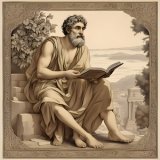The Serpent and the Eagle
"The Serpent and the Eagle" is not a book, but a fable from Aesop, a storyteller from ancient Greece. The fable tells the story of an eagle who carries a sleeping serpent into the sky, only for the serpent to wake up and bite the eagle. This story serves as a cautionary parable about the dangers of underestimating those we consider weaker or beneath us. Aesop's fables traditionally end with a moral, and the lesson in this story could be interpreted as a warning against pride and recklessness.
Genre: Children
Genre: Children
- 27 Views
A Serpent had succeeded in surprising an Eagle and had wrapped himself around the Eagle's neck. The Eagle could not reach the Serpent, neither with beak nor claws. Far into the sky he soared trying to shake off his enemy. But the Serpent's hold only tightened, and slowly the Eagle sank back to earth, gasping for breath. A Countryman chanced to see the unequal combat. In pity for the noble Eagle he rushed up and soon had loosened the coiling Serpent and freed the Eagle. The Serpent was furious. He had no chance to bite the watchful Countryman. Instead he struck at the drinking horn, hanging at the Countryman's belt, and into it let fly the poison of his fangs. The Countryman now went on toward home. Becoming thirsty on the way, he filled his horn at a spring, and was about to drink. There was a sudden rush of great wings. Sweeping down, the Eagle seized the poisoned horn from out his savior's hands, and flew away with it to hide it where it could never be found. An act of kindness is well repaid.
Translation
Translate and read this book in other languages:
Select another language:
- - Select -
- 简体中文 (Chinese - Simplified)
- 繁體中文 (Chinese - Traditional)
- Español (Spanish)
- Esperanto (Esperanto)
- 日本語 (Japanese)
- Português (Portuguese)
- Deutsch (German)
- العربية (Arabic)
- Français (French)
- Русский (Russian)
- ಕನ್ನಡ (Kannada)
- 한국어 (Korean)
- עברית (Hebrew)
- Gaeilge (Irish)
- Українська (Ukrainian)
- اردو (Urdu)
- Magyar (Hungarian)
- मानक हिन्दी (Hindi)
- Indonesia (Indonesian)
- Italiano (Italian)
- தமிழ் (Tamil)
- Türkçe (Turkish)
- తెలుగు (Telugu)
- ภาษาไทย (Thai)
- Tiếng Việt (Vietnamese)
- Čeština (Czech)
- Polski (Polish)
- Bahasa Indonesia (Indonesian)
- Românește (Romanian)
- Nederlands (Dutch)
- Ελληνικά (Greek)
- Latinum (Latin)
- Svenska (Swedish)
- Dansk (Danish)
- Suomi (Finnish)
- فارسی (Persian)
- ייִדיש (Yiddish)
- հայերեն (Armenian)
- Norsk (Norwegian)
- English (English)
Citation
Use the citation below to add this book to your bibliography:
Style:MLAChicagoAPA
"The Serpent and the Eagle Books." Literature.com. STANDS4 LLC, 2024. Web. 30 Apr. 2024. <https://www.literature.com/book/the_serpent_and_the_eagle_2356>.




Discuss this The Serpent and the Eagle book with the community:
Report Comment
We're doing our best to make sure our content is useful, accurate and safe.
If by any chance you spot an inappropriate comment while navigating through our website please use this form to let us know, and we'll take care of it shortly.
Attachment
You need to be logged in to favorite.
Log In